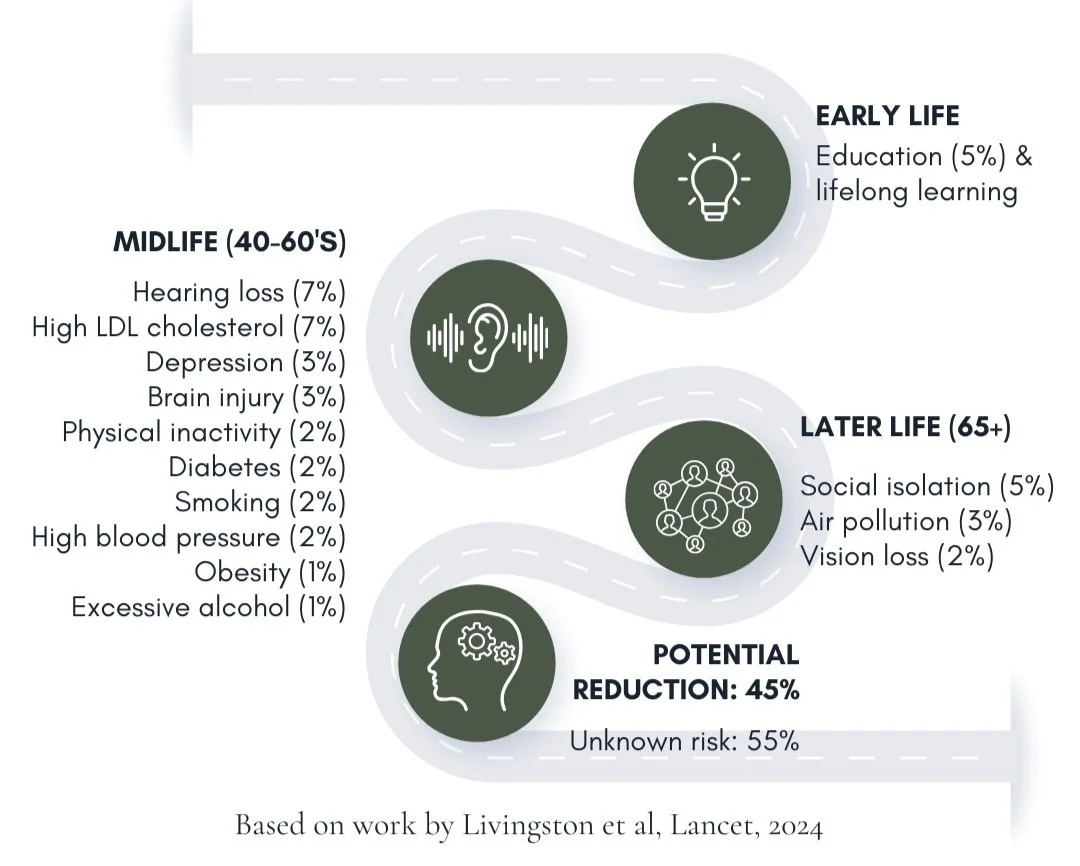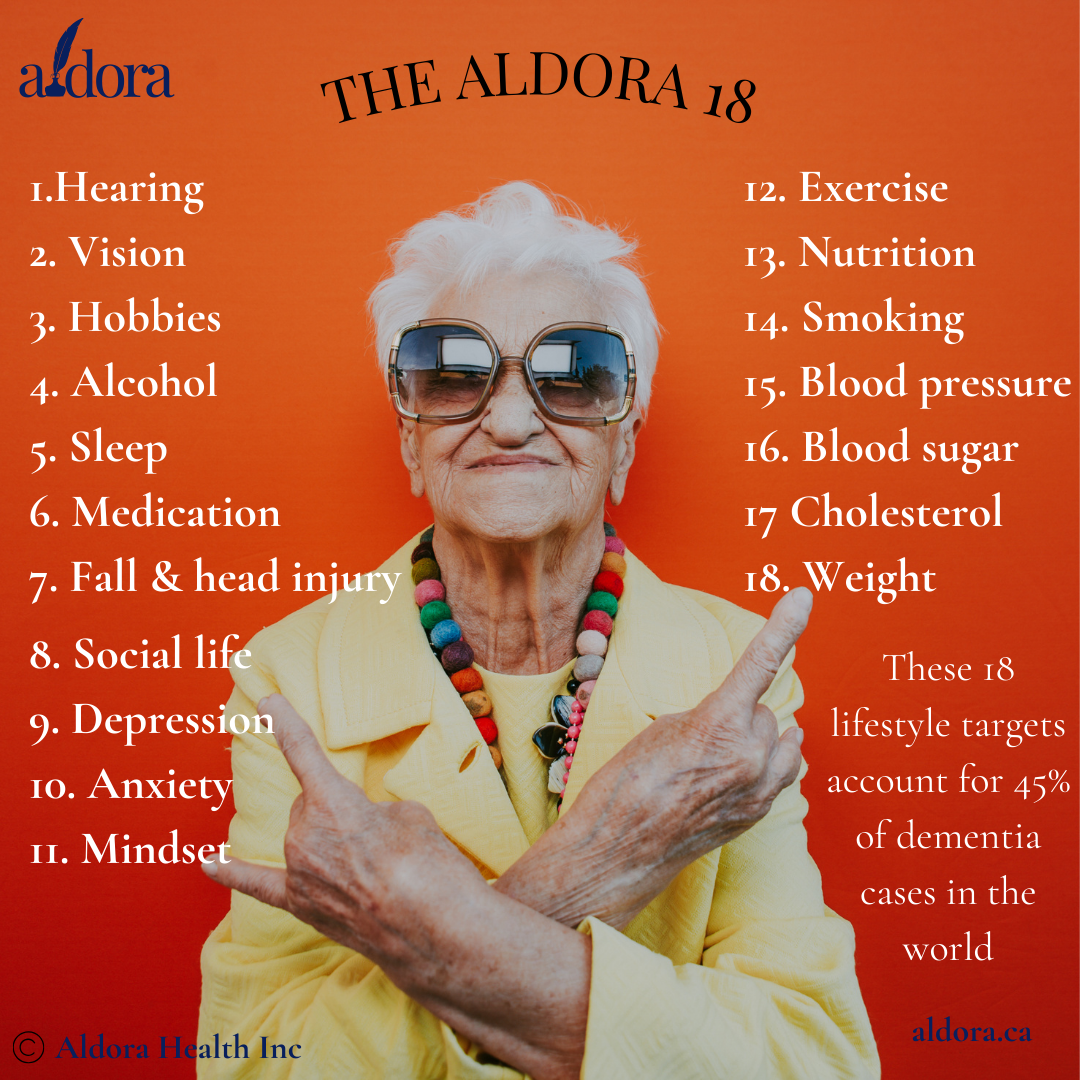Can dementia really be prevented?
Last Updated: Feb 2 2025
Table of Contents
Are you worried about developing dementia one day?
The science of dementia prevention has rapidly evolved in the last 7 years.
We now know that there are many things that are linked to dementia (called “risk factors”), which together account for at least 45% of the cases of dementia in the world.
Some of these targets can increase your personal chances of getting dementia by up to 220%, but if managed with simple steps, this risk goes away.
This article will introduce you to 18 different targets for dementia prevention.
Optimize them all to give yourself the best chance of a long and healthy life without dementia.
Let’s get started.
Keep reading… secrets to health are close by!
The research on prevention
As of 2024, researchers have found that 45% of dementia cases in the world could be prevented by tackling 14 risk factors (read the research here).
These risk factors are spread out across our lifetimes, but mostly cluster around midlife, or the ages of 40-60.
This means that these decades are the best time to start investing in your brain’s future.
14 ways to prevent 45% of dementia cases in the world.
Based on emerging research, sleep, nutrition, less medications, reduced stress, and a sense of purpose might also protect you from dementia.
This looks like:
Getting enough sleep and treating sleep apnea
Stopping certain medications with memory side effects
Reducing high levels of anxiety or stress
Building an open, growth mindset and defeating ageism
Eating a healthy diet with vitamins and essential foods
How does prevention work?
Prevention works by balancing your brain’s strength and reducing damage from dementia proteins or poor blood flow.
People often erroneously think dementia is solely determined by our genes and family history.
In fact, only about 10% of dementia cases come from genetic risks like the ApoE4 allele (for late-onset dementia) and certain inherited early-onset dementias like APP, PSEN1, or PSEN2 (read more here).
In reality, symptoms of dementia happen when abnormal proteins or poor blood flow cause more damage to your neurons than your brain can handle. This is the concept of ‘cognitive reserve’, which we explore more in this article.
Strength and damage are largely dictated by lifestyle factors, which is why targeting these factors can prevent you from experiencing clinical symptoms of disease.
Whether you have the buildup of dementia proteins in your brain matters less than whether you’ve cultivated a strong mind and reduced damage when it comes to experiencing dementia.
If your brain is strong enough you can overcome dementia damage for many years, and possibly your entire life.
Overall: The Aldora 18
Overall, these are the 18 targets for dementia prevention.
Optimal dementia prevention with Aldora.
Hearing: protect your ears from loud noises and wear hearing aids if you need them
Vision: protect your eyes from sun damage and get cataracts fixed
Hobbies: pursue more education, life-long learning, and push yourself to try new things
Alcohol: avoid excessive alcohol intake (<7 drinks a week)
Sleep: get 7-8 hours of sleep a night & treat sleep apnea
Medications: stop certain medications that cause memory problems
Fall Prevention: prevent falls that cause head injury
Social Life: build a strong friend group & social life
Depression: treat depression with lifestyle changes and/or medication
Anxiety: treat anxiety with lifestyle changes and/or medication
Mindset & anti-ageism: build a sense of meaning and personal power in your life, and don’t believe in outdated views on aging
Exercise: get a mix of aerobic, strength, and balance exercises every week
Nutrition: follow a Mediterranean diet and make sure you are not deficient in B12, Vitamin D, or Thiamine
Smoking: stop smoking
Blood Pressure: keep your number around 120/70 to 130/80.
Blood Sugar (Diabetes): treat with lifestyle changes and/or medications
Cholesterol: keep your LDL in the optimal range with lifestyle changes and/or medications
Weight: keep your weight in the recommended range
Will this guarantee I won’t get dementia?
No, but it will give you a pretty good chance.
We know that the less risk factors you have, the less likely you are to get dementia. People can live into their 90’s and even 100’s without dementia whether or not it runs in their families.
We also know that when you start having more than 3-6 risk factors the chances of dementia goes up, and you’re more likely to start showing signs of dementia at a younger age.
You can have a huge impact on your chances of dementia through lifestyle changes - leaving just the small risk that comes from your genes.
Next Steps
You now know WHAT you need to do. The next step is to learn HOW.
How do you get better hearing? How do you build your social life? What do you do manage your blood pressure?
If you have someone that’s an expert in one of these areas, lean on them for advice and suggestions.
Or, become a member to get access to all the above and more.
Related Posts
Key References
Livingston G et al. Dementia prevention, intervention, and care: 2024 report of the Lancet standing Commission. The Lancet, 2024; 404:572 - 628.
Sabia S, Fayosse A, Dumurgier J, et al. Association of sleep duration in middle and old age with incidence of dementia. Nat Commun, 2021; 12: 2289.
Chen H, Dhana K, Huang YH, et al. Association of the Mediterranean dietary approaches to stop hypertension intervention for neurodegenerative delay (MIND) diet with the risk of dementia. JAMA Psychiatry 2023; 80: 630–38.
Stott J, Saunders R, Desai R, et al. Associations between psychological intervention for anxiety disorders and risk of dementia: a prospective cohort study using national health-care records data in England. Lancet Healthy Longev 2023; 4: e12–22.
Disclaimer: The content on Aldora Health is for educational and informational purposes only and is not intended to substitute for professional medical advice, diagnosis, or treatment. Always seek the advice of your physician or other qualified health provider with any questions you may have regarding a medical condition. For more read our Terms of Use.








